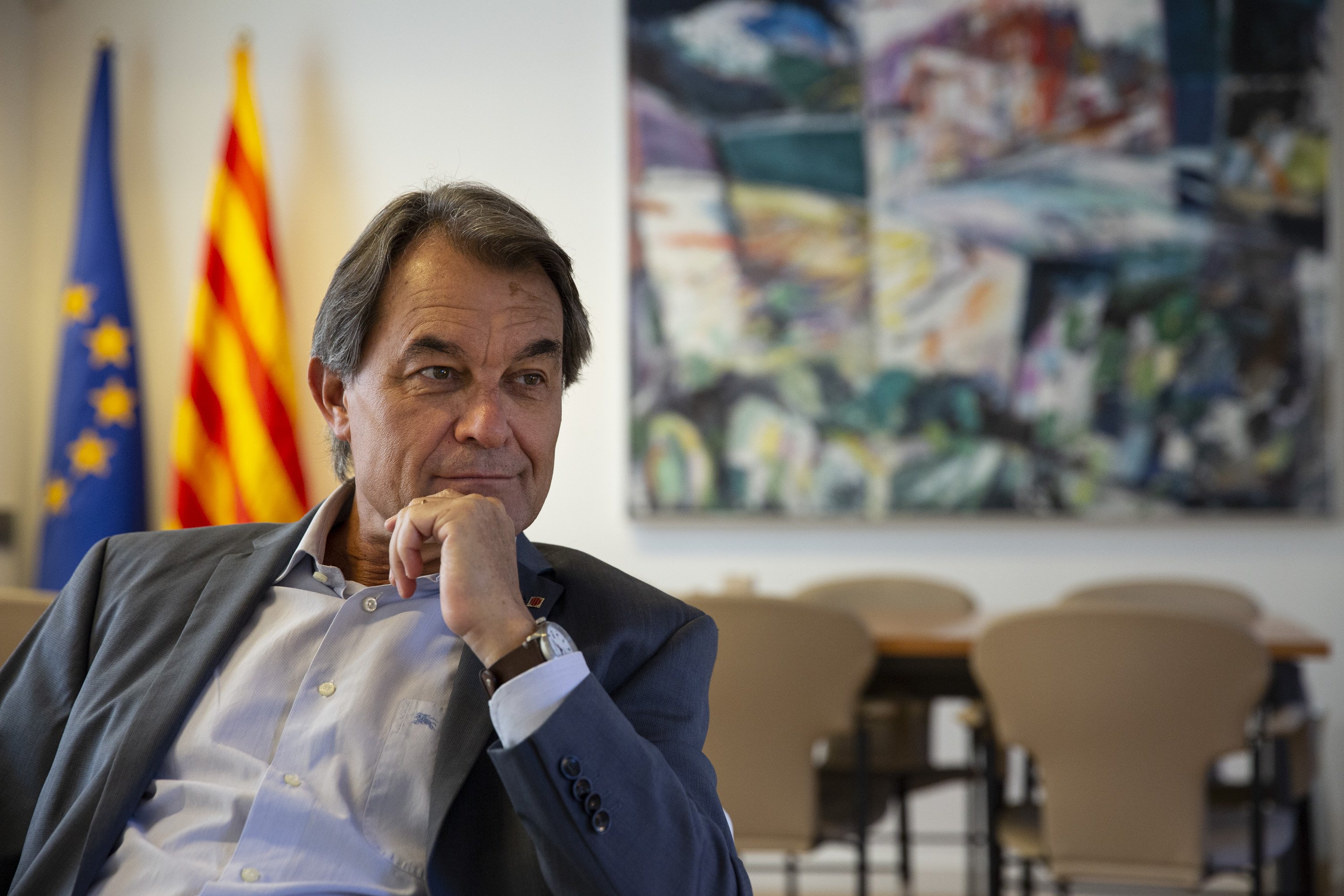Artur Mas (Barcelona, 1956) was president of Catalonia from 2010 to 2015 for the centre-right Convergència Democràtica de Catalunya (CDC). His decision to shift from Catalan nationalism to actively promoting independence whilst president would break up CDC's long-standing electoral alliance, CiU. He "stepped aside" as president in early 2016, giving way to Carles Puigdemont, as a condition for left-wing pro-independence party CUP to give its votes to the formation of a government following the election the previous September; within months, CDC would be "refounded" as PDeCAT.
Mas receives El Nacional in the office he gets as a former president in Palau Robert on Barcelona's passeig de Gràcia. He talks about his current successor, president Quim Torra, how Catalonia should react to the trial of pro-independence leaders in the Supreme Court in Madrid and what the future holds for the pro-independence movement.
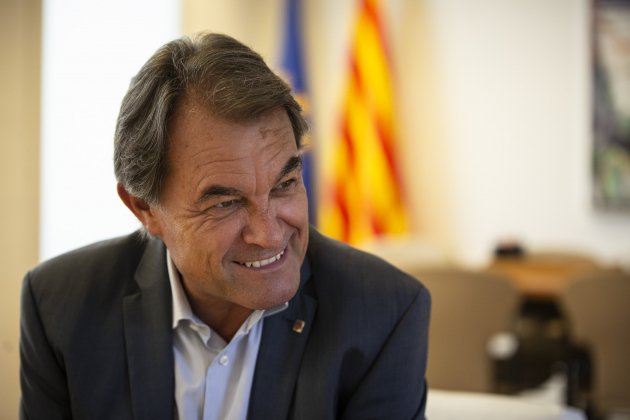
A month ago you went to see Carles Puigdemont in Waterloo. You agreed to "strengthen JxCat as a consolidated political reality". What does that mean?
JxCat was the central topic of that meeting: how to remake this political space, how to give it greater strength, coherence, greater performance and greater effectiveness.
And what conclusion did you reach?
We agreed on the diagnosis that it was a space that still needs straightening out and on the objective of trying to make JxCat, which today is a brand and a project, also turn into a political organisation. And that, if that happens, the whole world of Crida and PDeCAT should accept to refound itself within this definitive party. What we didn't agree on, because it doesn't depend on me as much, it depends more on him, is the method to reach this objective, the path. [In short, PDeCAT should be] a fully-fledged political party.
Where does PDeCAT fit into this?
There are two things to keep in mind: firstly, that beyond the topic of independence and the principle of self-determination that everyone agrees on, the project fits well with PDeCAT's ideological framework. Not 100%, because there's always going to be something to be given up. But there does have to be a clear idea of what type of country we're arguing for, and even what type of country we would build the day we're independent. And secondly, it should be remembered that PDeCAT has the experience as to how to lead a party and how to do so effectively, to the extent that it incorporates all the experience and tradition of a successful party like CDC.
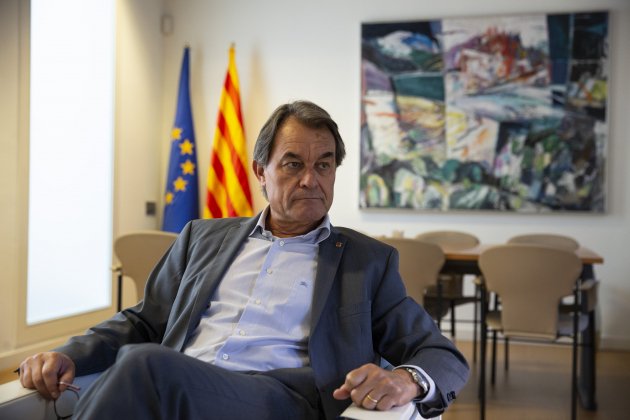
Does that mean that PDeCAT has to dissolve within JxCat?
I would advocate for that. But not just PDeCAT, Crida too. I'm talking about them as political parties, it's different if it's decided to turn them into foundations or associations to defend other aims... But if we're talking about political parties which stand in elections, my opinion is very clear. It's a different matter whether it's possible or not. That remains to be seen.
There's a possible conflict if Crida doesn't accept to join...
If Crida doesn't accept to join, it's clear that a whole series of things have to be reconsidered. I'm talking about what the English call a best-case scenario. You've got to fight to achieve it. If then in this battle you don't manage that then you've got to go for second best, which is what we'll do if there's no other possibility.
Distancing myself doesn't mean losing interest
And it's Carles Puigdemont who has to lead this?
It's what he told me, that he understands he has to lead it himself, which I totally understand and respect.
Will he be able to lead it from Waterloo?
One thing is to lead and another is to do it all. If he wants to be at the front he's got the right to be there, but that also requires him to do things and whatever he can't do, share it and delegate it to other people.
In all of this panorama there's also Quim Torra. How do you see the current president given your knowledge of what the role entails?
I got a very different era, with a brutal social and economic crisis, with enormous cuts required, with brutal pressure from the PP with their absolute majority [in Madrid]... It was a CiU government, which has nothing to do with the current situation. It was a completely different era. From the point of view of the leadership of the government and management, I'm among those who think that the current government does more than people say.
And the president's role?
You can't ask president Torra to have the same profile as a politician who had established themselves over decades, as was the case with president Pujol, or president Maragall, or president Montilla or myself. We were people who came from a tradition of learning politics over a long time. President Torra became president without any political experience behind him. As such, asking him to fill the role of president in the same way his predecessors did, who had a totally different and much more consolidated experience, wouldn't be fair on him.
Do you keep in contact with president Torra?
Yes. It's not a frequent contact, because I've moved far away from the strict frontline and more so from the government. Especially since October 2017, I've distanced myself a lot. But distancing myself doesn't mean losing interest.
Torra has started talks to discuss what response should be given to the sentence in the trial in the Supreme Court. Have you talked about it?
Yes. Before he started these talks, he and I met in the government palace and talked about it.
The expectation is that the sentence will be negative and moreover unjust
And what do you believe the response should be?
There should be three responses after the sentence. The first, a legal one, with the expectation that the sentence will be negative and moreover unjust: the later legal path needs to be organised. There's a Constitutional Court which you can trust as much as you can trust it, but then there are European courts, which will have the final say in the coming years. So this doesn't end in Madrid. It ends in Strasbourg. This is the first reaction. The second has to be the public reaction. By the people. This movement was born because pro-sovereignty people pushed hard for it. And when you push hard you've got a responsibility. And that means that ANC, Òmnium, AMI, etc have to design their response. And the third response, the one that does fall to the parties and institutions, has to be the institutional response.
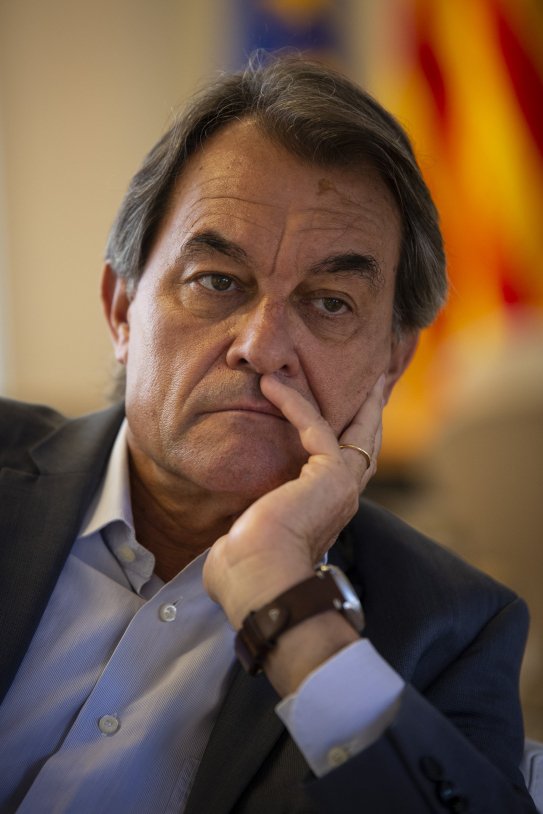
What should this institutional response be?
It could be very different things, it depends on president Torra and how he wants to arrange it. One possible institutional response would be votes in the Parliament on a series of concepts, headed by the right to self-determination, but to make it clear that the Parliament ratifies by a large majority the exercising of the right to self-determination. In other words, we don't have to become scared and give in because there's a sentence.
[An election] is the easiest [response], but not the best nor the most intelligent nor the one that's in our best interest
Any other proposals?
The other possible response would be to become aware from that moment that the sovereignty road map has to be replaced and for president Torra to commit to reconfiguring it in the near future. Another possible response is to look whether the government needs to bring in more opinions.
Could an election be called?
I don't think so, because it's the easiest [response], but not the best nor the most intelligent nor the one that's in our best interest. It's easy to do but you put at risk something which shouldn't be put at risk, namely this pro-independence majority in the Parliament there is today. And moreover you cause an election at a time when all these things we've cited have to be replaced and rebuilt. This is the job: how we ensure the greatest social cohesion and harmony, how we remove PSC from the 155 [bloc], how we remake the sovereignty road map, how we rebuild internal trust, how we improve international alliances... These are all very important tasks at a country-wide level which can form part of the response.
I have no need to fight for anything in terms of a role or a status, or a specific responsibility. My attitude is more of what is asked of me and how I can help the most
A question which has seemed almost inevitable for weeks is what role Artur Mas has to have in all of this? There's been a lot of talk about your return to frontline politics...
Artur Mas has no need to have any important role in any of this. During years, I fought to have a role, indeed the role, and it's public knowledge and well-known that that fight was very intense. At this point of my journey in politics and life, I have no need to fight for anything in terms of a role or a status, or a specific responsibility. My attitude is more of what is asked of me and how I can help the most.
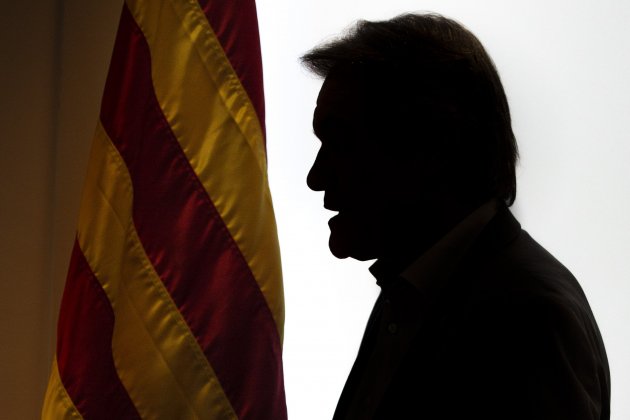
The state's repression has managed to leave pro-independence parties leaderless...
It's managed to dilute the leadership, that's clear. And new [leaders] have to appear. And that's a task that's on the table and which needs to be given firm commitment. Hoping that people who will be at a minimum banned from public office for many years, who are those who are in prison, will be able to again take on electoral leadership is unviable. Hoping that the people in exile who won't be able to return to the country can do the same thing is unviable. As such, it's clear that the state has acted, has tried to dilute, or even remove, as some say, this leadership. It's clear that they've managed to do so in part, but it's not at all clear that no new faces can appear.
One thing is to not be scared and another is to ignore the experience
Far-right party VOX said at the end of the trial that it should be used as punishment and as a warning for the future. Could this affect the appearance of new leaders?
I don't believe so. I see people who are convinced enough to not be scared. Now, one thing is to not be scared and another is to ignore the experience. Not being scared doesn't mean thinking you're all that. The bravest person isn't the one who shouts the most. The bravest person is the one who risks the most, ignoring the personal repercussions, but at the same time also protecting the interests of the project and the collective interest. You've also got to have judgement to do that. I see many people prepared to take the risk, but also to use their judgement. I'll put it another way, now we have maps of what's happened in these last few years and knowing the reaction of Spain and Europe, it would be unacceptable to act without taking this experience and these objective facts into account.
The project is alive. The voters are there. There is no offer, nor will there be, that offers a definitive solution to the matter of Catalonia on Spain's part
Do you see room to continue?
Yes. I see plenty of room. The project is alive. The voters are there. There's no alternative viable project. There is no offer, nor will there be, that offers a definitive solution to the matter of Catalonia on Spain's part. They can patch things, improve a few specific situations. All of that. But a structural solution to the democratic challenge raised by Catalonia? Spain's not prepared to do that. The trio of right-wing parties it's clear can't, the only thing it wants to do is crush everything. PSOE isn't prepared to do so because, among other reasons, it would break it internally. A structural solution could be a self-determination referendum, like Britain and Scotland; Spain's isn't capable of doing that. And the only party which can help a little is Podemos. As such, this is the project, to keep on our course. We've got it set. Knowing that that requires more time than some thought, greater majorities than had been said, better European and international alliances than we have, and which require us to have a good strategic plan, a good road map, to know the steps we've got to take from here on. As such, there's a lot of work to do.

